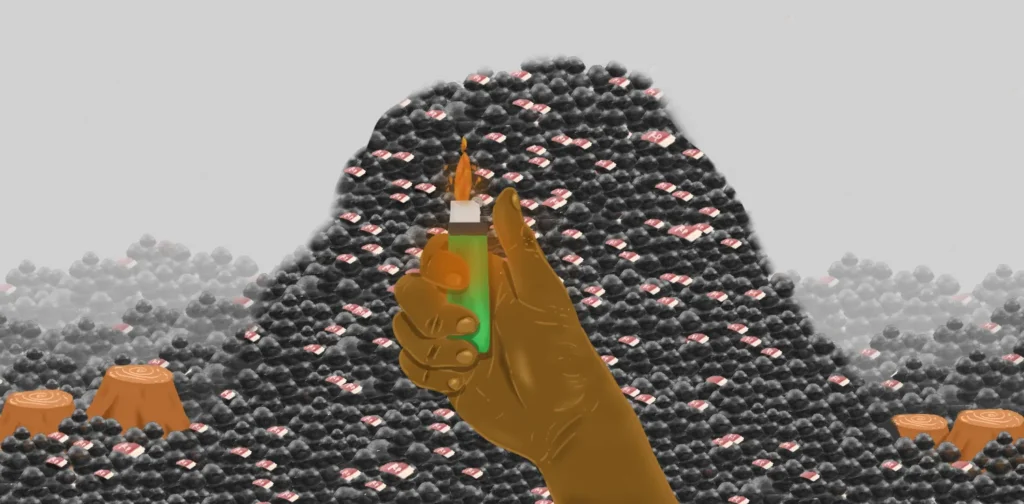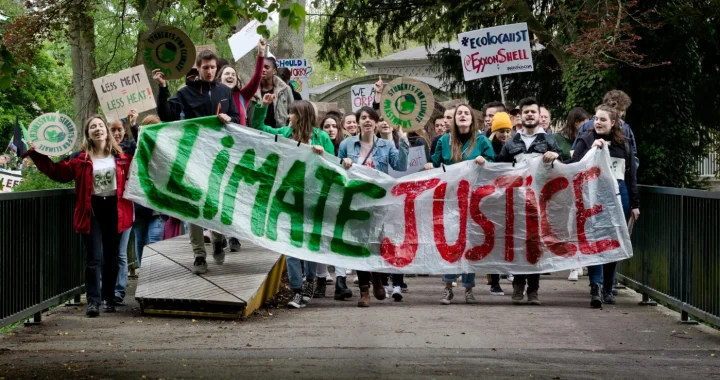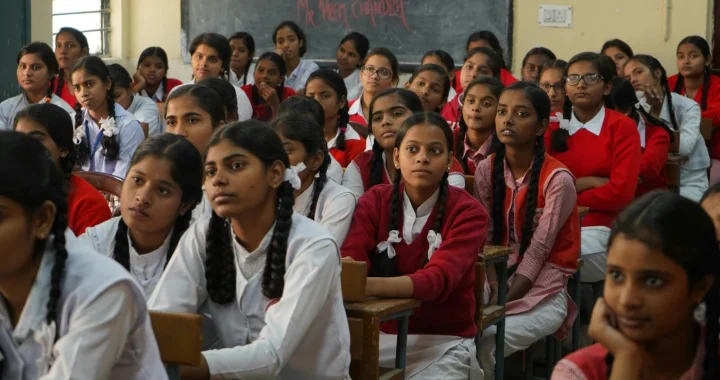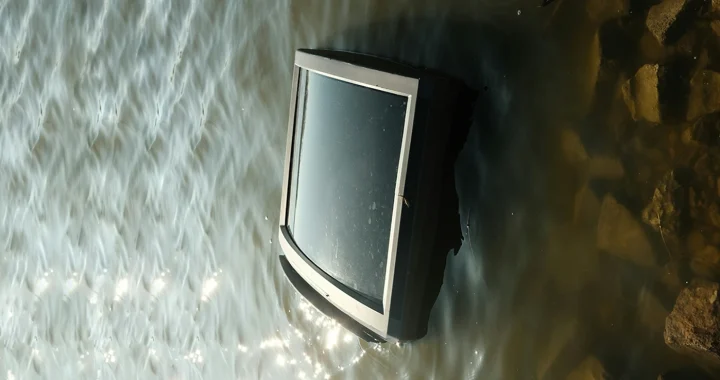People versus Coal: Should Danantara fund Indonesia’s coal downstreaming and DME project?

Illustration by Irhan Prabasukma
In February 2025, Indonesian President Prabowo Subianto launched the Investment Management Agency (BPI) Daya Anagata Nusantara (Danantara). At the launch, President Prabowo revealed that Danantara’s US$ 20 billion investment would be allocated to dozens of national strategic projects, one of which is for the development of renewable energy. This brought tentative hope for the acceleration of the green transition in Indonesia. However, that hope has now darkened as things came to light.
At a limited meeting with the National Energy Resilience and Downstream Task Force at the Merdeka Palace in early March, President Prabowo gave instructions to restart the DME project—coal gasification project into dimethyl ether (DME)—using the Danantara capital.
Danantara for Coal Downstreaming, a False Solution to Energy Transition
Danantara’s funding plan for the DME project is very controversial for several reasons. One of them is because its products have economic constraints. United States (US) companies have withdrawn from the DME project in Tanjung Enim, South Sumatra, due to high initial investment costs.
Another reason is from an ecological perspective. Coal gasification still produces greenhouse gas (GHG) emissions that pollute the atmosphere. A study by the environmental organization Action for Ecology & People’s Emancipation (AEER) revealed that the DME project would produce GHG emissions five times greater than liquid petroleum gas (LPG). The emissions would come from the process of extracting coal as raw material as well as downstream from the DME production process.
By AEER calculations, a DME project with a capacity of 1.4 million tons per year will require around 6 million tons of coal. The process will produce an equivalent of 4.26 million tons of CO2 emissions per year. In short, funding the DME project is a false answer to Indonesia’s energy transition dreams.
Danantara and DME Project Impacts Beyond Emissions
With funding from Danantara, the Indonesian government plans to restart coal gasification projects in three locations in Sumatra and Kalimantan. Unfortunately, monitoring results from the East Kalimantan Mining Advocacy Network (JATAM) on the coal gasification project carried out in Kutai, East Kalimantan, are worrying. As explained by Campaign Division Head Fachri Aziz in a discussion on Underground Coal Gasification (UCG), the project has worsened air pollution, decreased forest area, and forced evictions of surrounding communities.
Similar situation occurred in Australia. UCG practices in Queensland, Australia, caused horrific pollution. Around 300 square kilometers of land was contaminated by hazardous substances leaking from the UCG process. The massive damage made the Queensland state government finally banned UCG.
Coal Producer and Exporter
Then, why is the government using Danantara to ignore environmental and climate issues? Their answer would likely be because Indonesia is a coal producer. According to data from the Ministry of Energy and Mineral Resources (ESDM), Indonesia has very large coal reserves, estimated to reach 91 billion tons. If the production rate is around 200-300 million tons per year, then the mine life can reach 100 years.
Not only a producer, Indonesia is also a coal exporter. Data from the Central Statistics Agency (BPS) revealed that Indonesia’s coal exports in 2022 alone reached 360 million tons.
So, the government will certainly argue that Indonesia’s coal reserves and their large export value will bring money to the country. It seems that the government is so fascinated by the short-term economic benefits that it forgets the negative long-term environmental impacts.
Saving the Dirty Coal Industry
Danantara’s funding for coal downstreaming is not the first time the government has tried to save the coal industry. For instance, the government has distributed coal mining concessions to Islamic mass organizations under the official reason of economic equality. However, many speculate that the real goal is to protect the coal industry from public criticism as public awareness on the destructive power of coal to nature rises.
The doubt on the government’s commitments to green transition keeps mounting as we look at President Prabowo’s track record, which is relatively close to the coal mining industry. According to the Mining Advocacy Network (JATAM), he was once a shareholder of several coal companies. Then, in the 2024 presidential election, Prabowo received support from one of the top brass of the largest coal company in the country. The ranks of his successful campaign team also include a former legendary oil and gas and coal entrepreneur in Indonesia.
Time to Speak Up
At the Climate Change Summit (COP26) in Glasgow in 2021, 190 countries and organizations agreed to eliminate coal. Greenpeace reported that by 2017, more than a quarter of companies that originally owned or developed coal power generation had completely abandoned the coal power generation business. More and more coal power plants are shutting down, in line with the global coal phase-out.
The world is starting to abandon coal. Thus, Danantara’s funding plan for the DME project shows the absence of a green economic vision within the institution.
The public—including scientists, experts, practitioners, activists, students, and sustainability advocates—must speak up to prevent Danantara from funding coal downstreaming. We cannot place our hope on the parliament, which seems to have become “yes men” for the President like in the New Order era. More than ever, now is the time to speak up. If the public is silent, the wellbeing of the environment and the safety of the majority of citizens will be sacrificed to fulfill the interests of a handful of super-rich people, who happen to be close to or at the center of political power in Indonesia.
Editor: Nazalea Kusuma

Co-create positive impact for people and the planet.
Amidst today’s increasingly complex global challenges, equipping yourself, team, and communities with interdisciplinary and cross-sectoral insights on sustainability-related issues and sustainable development is no longer optional — it is a strategic necessity to stay ahead and stay relevant.
Firdaus Cahyadi
Firdaus is the founder of Indonesia Climate Justice Literacy, an organization that promotes climate justice discourse in Indonesia. He is also a board advisor of the youth organization Climate Rangers Indonesia. He also actively writes about environmental issues in various major publications in Indonesia.


 From Anxiety to Action: How Youth Climate Activism Is Evolving
From Anxiety to Action: How Youth Climate Activism Is Evolving  India’s Supreme Court Declared Menstrual Health and Hygiene as Fundamental Rights
India’s Supreme Court Declared Menstrual Health and Hygiene as Fundamental Rights  Impacts of E-waste Pollution on Animals and Human Health
Impacts of E-waste Pollution on Animals and Human Health  Africa’s Solar Energy Surge: Why 2025 Was a Breakthrough Year
Africa’s Solar Energy Surge: Why 2025 Was a Breakthrough Year  Agrihoods: Integrating Farms and Urban Neighborhoods into Sustainable Communities
Agrihoods: Integrating Farms and Urban Neighborhoods into Sustainable Communities  Women in Waste Management: Asia’s Circularity Runs on Women. Its Policies Still Don’t
Women in Waste Management: Asia’s Circularity Runs on Women. Its Policies Still Don’t